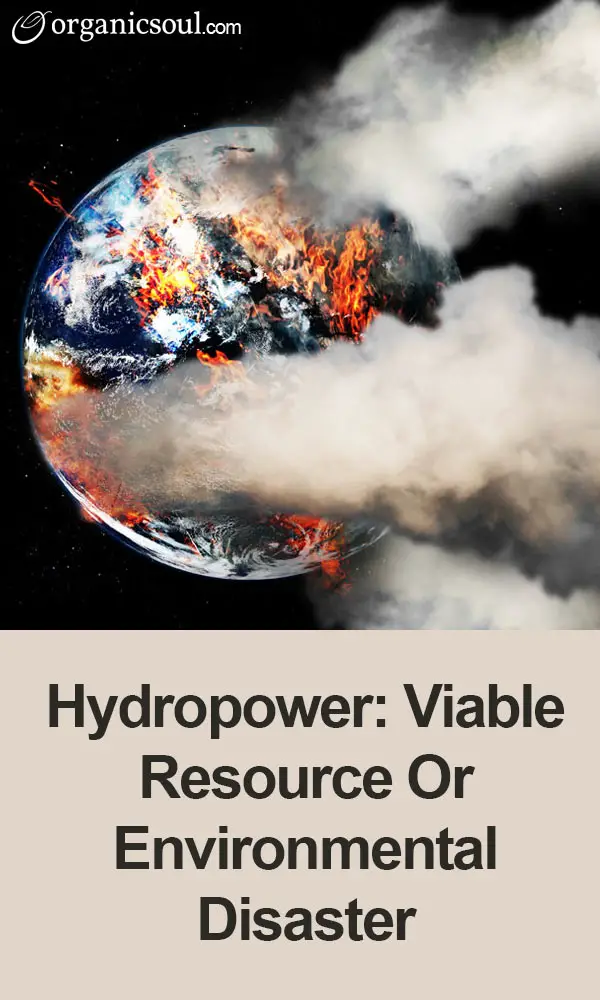
Finding sustainable and renewable sources of energy is the all-important mission of the day. Our population is expanding at an enormous rate and, consequently, it demands more and more energy. Consider this: for everyone one person who dies, two are born to take his or her place. It is clear that progress in the energy sector is of vital importance, and is more a matter of ‘when’ rather than ‘if’.
Like Organic Soul on Facebook
That said, how promising is hydropower? If offers some notable perks, no doubt, but there are many opponents to the expansion of hydropower, citing its butterfly effects. One thing is certain: we need to find new energy. In the spirit of even handedness, let’s hear the top three arguments for both sides, shall we?
Why We Should Use Hydropower
Reason 1. It is a renewable, clean energy source
Perhaps the best reason in support of hydropower is the fact that it is a renewable resource. Hydropower is driven by the natural water cycle; water falls as precipitation, is diverted into rivers, lakes, and oceans, and then evaporates and heads back into the atmosphere. The water cycle, as we know, is only possible because of the sun. Because the sun is the main energy source of the water cycle, hydropower is a renewable, natural resource.
It is also a clean energy source. Hydropower facilities produce no air pollution and they are relatively low in emissions when looking at the entire lifespan of the facility.
Reason 2. It is a domestic source of energy
Hydropower also means that we’ll be generating a ton of electricity. Towns near hydroelectricity plants can be completely powered by the station, and with the long life of dams, it is a useful source of energy for these local communities. Tied to both of these is the fact that hydropower is a domestic source of energy, meaning we don’t need to seek it out in other countries and Americans will be the ones flipping the switches and pulling the levers.
This means less pollution for transportation (as compared with oil from the Middle East), and jobs available here in the US.
Reason 3. It provides for an area of recreation
Hydropower also creates a recreational opportunity for communities. Project services include boating, fishing, water skiing, and swimming. The Federal Energy Regulatory Commission usually requires hydropower facilities to provide open, free public access.
This helps to create a sense of communal identity and supports community interconnectedness.
Why We Should Not Use Hydropower
Reason 1. Environmental Damage
Regardless of the benefits, there are some gapping problems with hydropower. First, it can devastate an entire ecosystem. In order to have hydropower sometimes requires government to flood scenic areas and valleys. This does damage to both the land and to the animals that live there. For example, unless equipped with a “ladder”, migrating fish can be blocked by dams.
Furthermore, it alters the streams and rivers flowing into and out of the reservoir. And because it alters the levels of streams and rivers, much of the silt that normally would be cleared out is simply built up. Even the water quality is affected, which can have repercussions for plant and animal life.
In a sense, these ‘clean’ energy sources aren’t clean at all. They require the entire destruction of forests, which produces methane – a greenhouse gas.
Reason 2. Aesthetic Damage
Within the last argument is another: as it does environmental damage, it also does aesthetic damage. Scenic areas are required to be flooded, and other streams can be completely dried up because of dam creation. Really, we destroy a natural ecosystem in pursuit of an artificial one. How does this fit in with sustainability?
Using hydropower means leaving a permanent mark on the environment.
Reason 3. It is unsafe
While dams are overall very safe, you cannot rule out the possibility of a break. With such an event, not only is the investment ruined but there are also thousands of lives in jeopardy. Having a town downstream can be extremely dangerous.
Furthermore, the ecosystem downstream will also be destroyed. After a dam break, it is uncertain how the water will act, and it could result in the flooding of entire other valley, which means all the environmental consequences described above will simply occur again.
Conclusion
Bigger and better energy sources are always being sought out by government and private companies, and hydropower has been considered and implemented a number of times. However, hydropower has its hurdles to overcome, as seen, if it wants to be a truly dependable resource.
What is the best choice? Largely, the decision should be left up to the local community after the appropriate risks and benefits are weighed. As some people say, you have to crack a few eggs to make an omelet. Then again, if it’s going to be a useless omelet, why crack them?
















